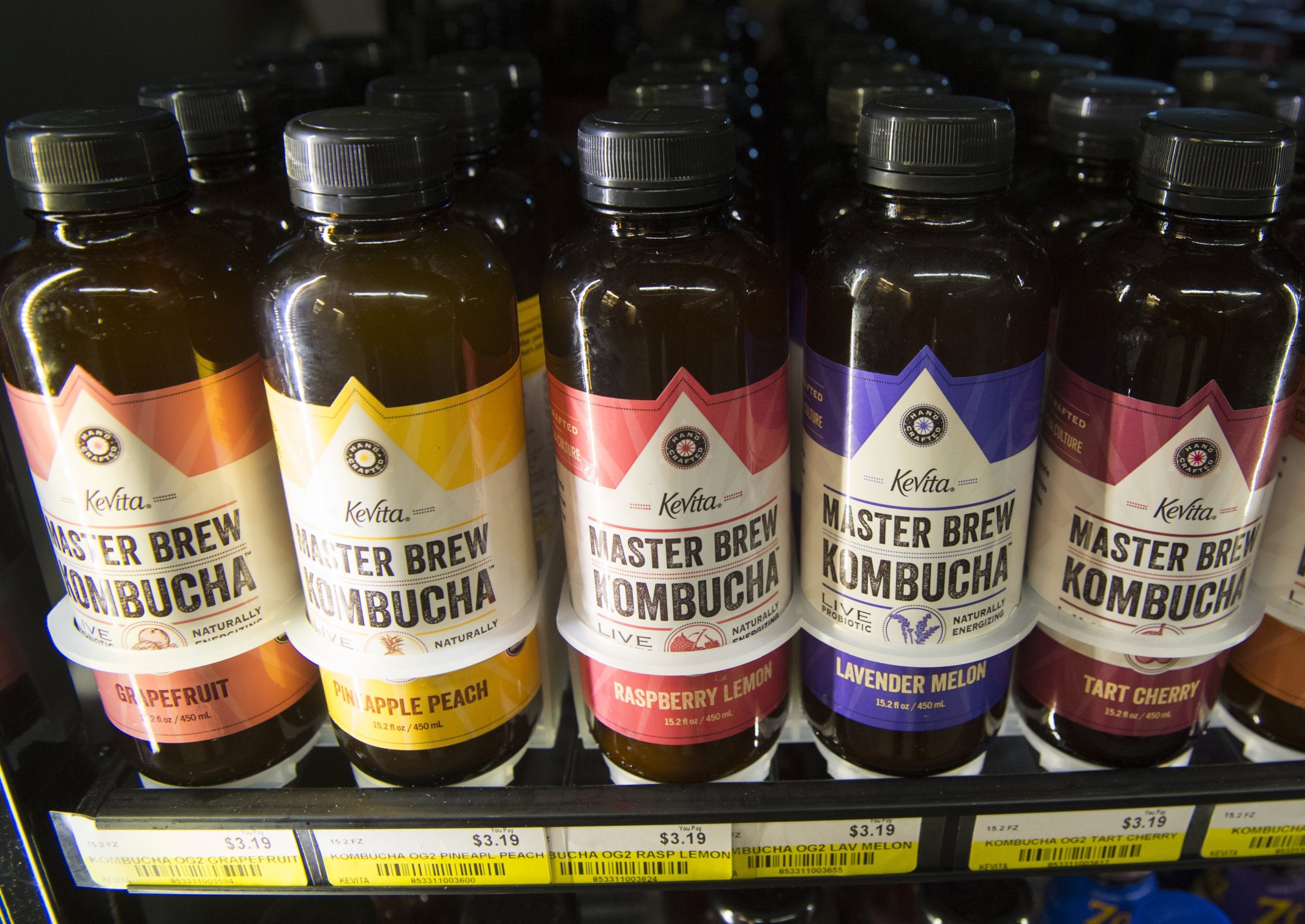
If you do any shopping at health food stores, you’ve no doubt noticed kombucha teas taking over the shelves. Your foodie friends may swear by the fizzy stuff. But if you haven’t jumped on the kombucha bandwagon yet, there are a few things you might want to know—it’s a probiotic, but guzzling too much can cause serious bodily harm.
It’s not just a fad
Kombucha has actually been around for thousands of years. In fact, it first appeared in China in 220 BC.
It’s made with microbes
To make kombucha, sugar-sweetened tea is fermented with a starter culture to create an “effervescent, tangy-tart end product,” says Wendy Bazilian, RD, co-author of Eat Clean, Stay Lean ($13, amazon.com). The starter culture is a symbiotic colony of bacteria and yeast—or SCOBY for short—that’s sometimes referred to as a “mushroom.” But that’s a misnomer since the SCOBY is completely unrelated to fungi, Bazilian explains.
Health.com: Foodie Friday: Honest Tea Kombucha
It’s a probiotic
Just like yogurt, kefir, and kimchi, kombucha is loaded with beneficial bacteria, says Bazilian. And a wealth of research suggests that the “good” bacteria in probiotic foods can help keep you regular, improve digestion and boost your immunity.
It has other nutrition perks too
“Kombucha contains phytochemicals or phytonutrients that have antimicrobial and antioxidant properties,” says Bazilian. Animal studies have shown that these antioxidants can promote healthy liver and kidney function, and reduce diabetic complications. Plus, kombucha is rich in B-vitamins and folic acid, which is key for helping the body produce and maintain new cells, says Megan Roosevelt, RD, founder of HealthyGroceryGirl.com.
It’s the subject of many health claims
Kombucha is touted as detoxifying, energy boosting, and more. But it’s not the “miracle drink that some would have us believe,” says Bazilian. “No one food has all the answers,” she points out. And there isn’t enough solid research to back up kombucha as a complementary remedy, she says.
Health.com: The Healing Power of Tea
But it can help promote a healthy diet
There’s no question the fizzy tea can be a good alternative to sugar- and chemical-laden soda. And as Bazilian points out, drinking kombucha can also help encourage overall wellness: Kombucha feels like a fun treat, which can make other healthy habits feel fun too, says Bazillian. “As long as you’re also eating a nutritious whole foods diet on the side, then it’s totally a positive thing.”
Just watch out for added ingredients
“Some brands can be high in added sugar,” warns Roosevelt. “Aim for kombucha with 5 grams of sugar or less per serving.” She also recommends checking the serving size because one bottle may contain two servings. Plus, just like you would with any packaged food, scan the label for hard-to-pronounce ingredients. If you can’t find an ingredient on grocery store shelves, there’s a good chance you don’t want to put it into your body, says Bazilian.
You can drink too much
Kombucha contains lactic acid, and “there is some thought that, in excess, drinking kombucha could cause lactic acidosis, a build-up of lactic acid in the blood stream that can be life-threatening,” Bazilian says. But as long as you’re not guzzling bottle after bottle, the risk is pretty slim.
Health.com: Chill Out and Feel Better With an Herbal Iced Tea
Don’t rely on it for a major caffeine boost
Like many types of tea, kombucha contains some caffeine, though the amount tends to be pretty low—anywhere from 2 to 25mg—far less than coffee (95mg) and even less than most caffeinated teas, says Bazillian. That said, if you’re trying to kick a caffeine habit, it might be best to skip this brew.
It contains some alcohol
But there’s little chance you’ll even get a buzz. Bottled brews in the grocery store contain less than 5% alcohol, explains Bazilian. That means you’d have to throw back six or more 12-ounce bottles to consume the same amount of alcohol in a single light beer.
However, some brands of kombucha are marketed and sold as alcoholic beverages, Bazilian points out. And if you brew your own kombucha, the alcohol content tends to be a bit higher.
Home brew can be risky
If you’re considering DIY kombucha, proceed with caution, advises Bazilian. “Be aware, it’s a little different than baking a cake,” she says. “When you’re fermenting a live organism like bacteria or yeast at home, then food safety is an issue.” In fact, some cases of heart attacks, lead poisoning, and allergic reactions may be linked to home-brewed tea. If you decide to go for it anyway, says Bazillian, at least make sure you’re following safe cleaning and brewing methods from a source you trust. (Roosevelt offers a how-to guide on her site.)
Want to play it safe and stick with the store-bought stuff? Jayson Calton, PhD, co-author of The Micronutrient Miracle, recommends the brand LIVE Kombucha Soda.
This article originally appeared on Health.com.
More Must-Reads from TIME
- Donald Trump Is TIME's 2024 Person of the Year
- Why We Chose Trump as Person of the Year
- Is Intermittent Fasting Good or Bad for You?
- The 100 Must-Read Books of 2024
- The 20 Best Christmas TV Episodes
- Column: If Optimism Feels Ridiculous Now, Try Hope
- The Future of Climate Action Is Trade Policy
- Merle Bombardieri Is Helping People Make the Baby Decision
Contact us at letters@time.com